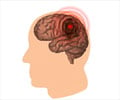The new study might help to explain why patients after stroke often suffer from cardiac problems and why patients with cardiac disease often have impaired cognitive function.

‘The new study might help to explain why patients after stroke often suffer from cardiac problems and why patients with cardiac disease often have impaired cognitive function.’





In a second phase, the diastolic phase, the blood flows back and the heart fills up again. In a previous publication from the MPI CBS, it was reported that perception of external stimuli changes with the heartbeat. In systole, we are less likely to detect a weak electric stimulus in the finger compared to diastole. In systole a specific component of brain activity, which is associated with consciousness, the so called P300-component is suppressed. In other words, it seems that - in systole - the brain makes sure that certain information is kept out of conscious experience.
The brain seems to take into account the pulse which floods the body in systole and predicts that pulse-associated bodily changes are "not real" but rather due to the pulse. Normally, this helps us to not be constantly disturbed by our pulse. However, when it comes to weak stimuli which coincide with systole we might miss them, although they are real.
During their investigations on heart-brain interactions, Al and colleagues also revealed a second effect of heartbeat on perception: If a person's brain shows a higher response to the heartbeat, the processing of the stimulus in the brain is attenuated - the person detects the stimulus less. "This seems to be a result of directing our attention between external environmental signals and internal bodily signals.", explains study author Al. In other words, a large heartbeat-evoked potential seems to reflect a "state of mind", in which we are more focused on the functioning of our inner organs such as the blood circulation, however less aware of stimuli from the outside world.
The results not only have implications for our understanding of heart-brain interactions in healthy persons, but also in patients.
Advertisement
Source-Eurekalert













